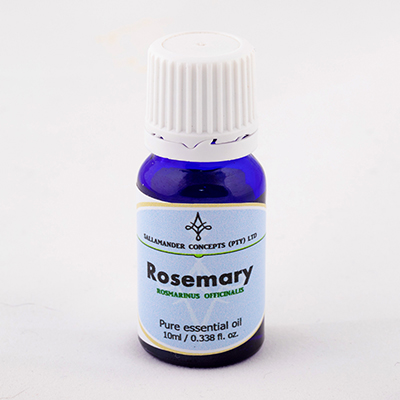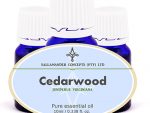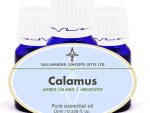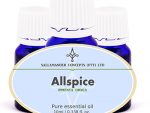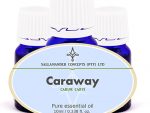Rosemary Essential Oil has a pronounced action on the brain and the central nervous system and is wonderful for clearing the mind and mental awareness, while having excellent brain stimulant properties, as well as improving memory. It helps with headaches, migraines, neuralgia, mental fatigue and nervous exhaustion and the antiseptic action of rosemary oil is especially suitable for intestinal infections and diarrhea, easing colitis, dyspepsia, flatulence, hepatic disorders and jaundice and relieving pain associated with rheumatism, arthritis, muscular pain and gout. It also helps for arteriosclerosis, palpitations, poor circulation and varicose veins. The diuretic properties of rosemary oil are useful with reducing water retention during menstruation, and also with obesity and cellulite. On the respiratory system, it is effective for asthma, bronchitis, catarrh, sinus and whooping cough. Because of its astringent action, it is also effective for countering sagging skin. Its stimulating action benefits scalp disorders and encourages hair growth. On the skin, it helps to ease congestion, puffiness and swelling and can also be used for acne, dermatitis and eczema, but a very popular use of this oil is the use in hair care products, as it has a pronounced positive effect on the health of the hair and scalp. It increases the circulation to the scalp and is therefore also effective for promoting hair growth.
Information on Rosemary Essential Oil
Rosemary Essential Oil is extracted from Salvia rosmarinus (reclassified – previously accepted as Rosmarinus officinalis and also known as Rosmarinus coronarium) of the Labiatae family. Another common name for Rosemary is incensier.
Rosemary Essential Oil, a crisp and clean smelling essential oil, is great for stimulating the brain, improving memory and mental clarity, while helping with a variety of congested respiratory tract problems, stiff muscles, coldness as well as boosting the liver and gall bladder.
It is also used for improving hair and scalp health.
Rosemary Essential Oil has a pronounced action on the brain and the central nervous system and is wonderful for clearing the mind and mental awareness, while having excellent brain stimulant properties, as well as improving memory.
It helps with headaches, migraines, neuralgia, mental fatigue and nervous exhaustion and the antiseptic action of rosemary oil is especially suitable for intestinal infections and diarrhea, easing colitis, dyspepsia, flatulence, hepatic disorders and jaundice and relieving pain associated with rheumatism, arthritis, muscular pain and gout.
Oil Properties
Rosemary Essential Oil has a clear, powerful refreshing herbal smell, is clear in color and watery in viscosity.
Origin
It is a shrubby evergreen bush that grows up to 1.5 meters (4 feet) high with green-gray needle-shaped leaves and pale blue/lilac flowers that bees just love.
It originated in Asia, but is now cultivated in France, Tunisia, Yugoslavia and is grown worldwide.
The name is derived from the Latin ‘Rosmarinus’ or ‘sea dew’, as it is rather fond of water.
The Egyptians, Hebrews, Greeks and Romans considered the herb as sacred and even in the Middle Ages it was used to ward off evils spirits and used as a protection against the plague.
It was burnt in French hospitals during epidemics.
Extraction
Rosemary oil is extracted from the fresh flowering tops by steam distillation. It yields 1.0 – 2.0 %.
Chemical composition
There are a wide variety of chemotypes available and some essential oils are simply sold without note being made of the chemotype. Some of the main chemical components of rosemary oil with a high camphor content are Camphor, 1,8-Cineole, α-Pinene, γ-Terpinene, Camphene, Bormeol, Verbenone, (+)-Limonene
Precautions
Rosemary essential oil has GRAS status, but it may be neuro-toxic due to the high camphor content. The 1,8-Cineol content suggests that this essential oil be kept away from the faces of children under the age of two years – this chemical constituent may cause neurological damage or slow breathing.
This oil is considered safe for topical use if it is used at the recommended dilution rate (see below).
As with most essential oils, this essential oil should be kept in a dark and cool place and should be stored in an airtight glass bottle (Preferably in the fridge at a temperature of around 4° Celsius / 39° Fahrenheit).
Please read our page with heading: Safety with Essential Oils before using this oil.
We recommend the following book as an excellent resource regarding safety:
Essential Oil Safety: A Guide for Health Care Professionals by Robert Tisserand & Rodney Young (#ad)
Therapeutic properties
The therapeutic properties of rosemary oil are analgesic, antidepressant, astringent, carminative, cephalic, cholagogue, cordial, digestive, diuretic, emmenagogue, hepatic, hypertensive, nervine, rubefacient, stimulant, sudorific and tonic.
For our glossary and explanation of these therapeutic terms, please click here
Uses
Rosemary Essential Oil has a pronounced action on the brain and the central nervous system and is wonderful for clearing the mind and mental awareness, while having excellent brain stimulant properties, as well as improving memory.
It helps with headaches, migraines, neuralgia, mental fatigue and nervous exhaustion and the antiseptic action of rosemary oil is especially suitable for intestinal infections and diarrhea, easing colitis, dyspepsia, flatulence, hepatic disorders and jaundice and relieving pain associated with rheumatism, arthritis, muscular pain and gout.
It also helps for arteriosclerosis, palpitations, poor circulation and varicose veins.
The diuretic properties of rosemary oil are useful with reducing water retention during menstruation, and also with obesity and cellulite.
On the respiratory system, it is effective for asthma, bronchitis, catarrh, sinus and whooping cough. Because of its astringent action, it is also effective for countering sagging skin.
Its stimulating action benefits scalp disorders and encourages hair growth.
On the skin, it helps to ease congestion, puffiness and swelling and can also be used for acne, dermatitis and eczema, but a very popular use of this oil is the use in hair care products, as it has a pronounced positive effect on the health of the hair and scalp. It increases the circulation to the scalp and is therefore also effective for promoting hair growth.
Burners and vaporizers
In vapor therapy, rosemary oil can be helpful for congestion, alcohol over-indulgence, overwork, sinusitis and mental and physical tiredness.
It furthermore stimulates the brain, improves memory and promotes clear thinking.
Blended Massage Oil and in the Bath
As a blended massage oil or diluted in the bath, rosemary oil can assist with liver and gall problems, mucus congestion, muscular aches, cramps, pains and spasms, stiff neck, overwork, rheumatism, arthritis, colds, constipation, diarrhea, coughs, bronchitis, back pain, scalp disorders, sinusitis, mental fatigue and physical tiredness.
Blended in Cream
In a cream or lotion it is most beneficial for improving blood circulation and decongesting the skin.
Shampoo
When added to shampoo it not only increases the circulation to the scalp and thereby improving hair growth, but also acts as a general conditioner and tonic for the hair and scalp.
Suggested Dilution Rates
On the skin
Adult:
Face: 0.5% to 1.5%
Body: 1.5% to 3%
Bath: 1.5% to 4%
3 to 24 months:
Face: Do not use – Avoid
Body: Maximum of 0.25%
Bath: Maximum of 0.25%
3 to 6 years:
Face: 0.25% to 0.5%
Body: 0.5% to 1%
Bath: 0.5% to 1%
6 to 15 years
Face: 0.5% to 1.5%
Body: 0.5% to 2%
Bath: 0.5% to 2%
Pregnancy
Face: 0.5% to 1.5%
Body: 0.5% to 2%
Bath: 0.5% to 2%
- When in doubt consult your doctor / medical professional before use.
- Most professionals and/or Aromatherapists will always err on the side of safety when giving advice regarding the use of essential oils and oleo resins during pregnancy.
- Quite a number of Aromatherapists advise that you should avoid all essential oils completely while pregnant, specifically during the first trimester. This is a very safe approach but may not be necessary at all.
Diffusers and Vaporisers
4 to 8 drops
General:
- When using for the first time – Always use the lowest dilution rate and build up slowly to the maximum. Stop using all essential oils on the skin if irritation or allergy occurs.
- Any advice or instruction received from a medical professional ALWAYS supersedes recommendations or advice found on this website. When in doubt consult your doctor / medical professional.
Summary
Rosemary Essential Oil is effective for mental fatigue, circulation problems, pain relief for the muscular system, de-congests the respiratory tract and is a skin and hair booster. Care should be taken when using Rosemary essential oil on children of 2 years of age and below. There is a potential risk of neurological damage and the essential oil can slow breathing.
Blends
Although most essential oils blend well together, Rosemary oil blends particularly well with Cedarwood, Citronella, Geranium, Lavender, Lemongrass and Peppermint.
| Weight | N/A |
|---|---|
| size | 10ml, 100ml |

